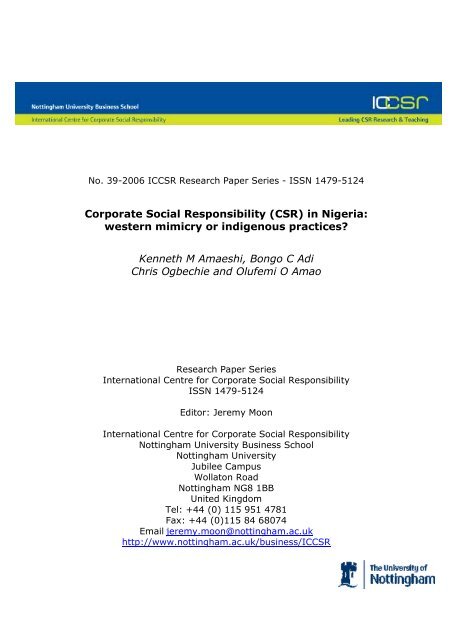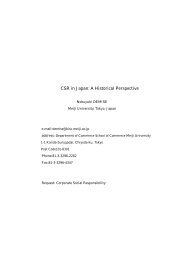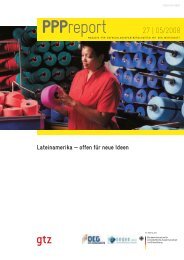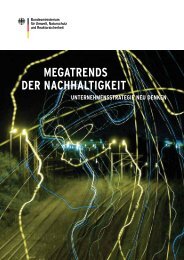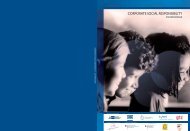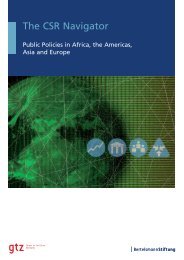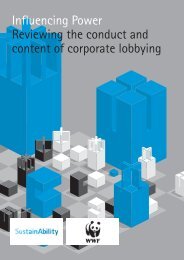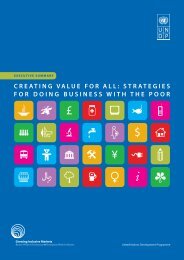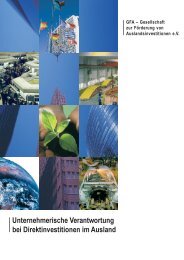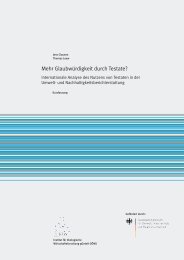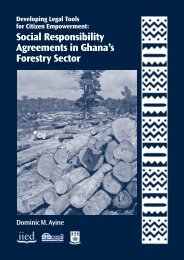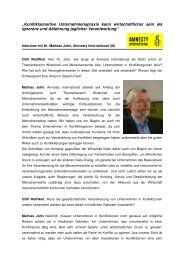Corporate Social Responsibility (CSR) in Nigeria: western mimicry ...
Corporate Social Responsibility (CSR) in Nigeria: western mimicry ...
Corporate Social Responsibility (CSR) in Nigeria: western mimicry ...
You also want an ePaper? Increase the reach of your titles
YUMPU automatically turns print PDFs into web optimized ePapers that Google loves.
Page1of44No. 39-2006 IC<strong>CSR</strong> Research Paper Series - ISSN 1479-5124<strong>Corporate</strong> <strong>Social</strong> <strong>Responsibility</strong> (<strong>CSR</strong>) <strong>in</strong> <strong>Nigeria</strong>:<strong>western</strong> <strong>mimicry</strong> or <strong>in</strong>digenous practices?Kenneth M Amaeshi, Bongo C AdiChris Ogbechie and Olufemi O AmaoResearch Paper SeriesInternational Centre for <strong>Corporate</strong> <strong>Social</strong> <strong>Responsibility</strong>ISSN 1479-5124Editor: Jeremy MoonInternational Centre for <strong>Corporate</strong> <strong>Social</strong> <strong>Responsibility</strong>Nott<strong>in</strong>gham University Bus<strong>in</strong>ess SchoolNott<strong>in</strong>gham UniversityJubilee CampusWollaton RoadNott<strong>in</strong>gham NG8 1BBUnited K<strong>in</strong>gdomTel: +44 (0) 115 951 4781Fax: +44 (0)115 84 68074Email jeremy.moon@nott<strong>in</strong>gham.ac.ukhttp://www.nott<strong>in</strong>gham.ac.uk/bus<strong>in</strong>ess/IC<strong>CSR</strong>
Page2of44<strong>Corporate</strong> <strong>Social</strong> <strong>Responsibility</strong> (<strong>CSR</strong>) <strong>in</strong> <strong>Nigeria</strong>:<strong>western</strong> <strong>mimicry</strong> or <strong>in</strong>digenous practices?Kenneth M Amaeshi, Bongo C AdiChris Ogbechie and Olufemi O AmaoAbstractDraw<strong>in</strong>g empirical evidence from <strong>in</strong>digenous firms, this study exploresthe mean<strong>in</strong>g and practice of <strong>CSR</strong> <strong>in</strong> <strong>Nigeria</strong>.It was found that<strong>in</strong>digenous firms perceive and practise <strong>CSR</strong> as corporate philanthropyaimed at address<strong>in</strong>g socio-economic development challenges <strong>in</strong><strong>Nigeria</strong>. This f<strong>in</strong>d<strong>in</strong>g confirms that <strong>CSR</strong> is a localised and sociallyembedded construct, as the ‘waves’, ‘issues’ and ‘modes’ of <strong>CSR</strong>practices identified amongst <strong>in</strong>digenous firms <strong>in</strong> <strong>Nigeria</strong> reflect thefirms’ responses to their socio-economic context. It is anticipated thatthis paper will add to the body of knowledge on <strong>CSR</strong>, especially as itrelates to Africa, which has a relatively dearth of literature on <strong>CSR</strong>;and provide some <strong>in</strong>sights to mult<strong>in</strong>ational firms operat<strong>in</strong>g <strong>in</strong> <strong>Nigeria</strong>.Keywords: <strong>Corporate</strong> <strong>Social</strong> <strong>Responsibility</strong>, Socio-legal bus<strong>in</strong>esscontext, Develop<strong>in</strong>g countries, Africa, <strong>Nigeria</strong>Authors
Page3of44AuthorsKenneth M. Amaeshi(Warwick Bus<strong>in</strong>ess School, United K<strong>in</strong>gdom),Bongo C. Adi(Regional Development Economics, University of Tsukuba, Japan)Chris Ogbechie(Lagos Bus<strong>in</strong>ess School, Pan-African University, <strong>Nigeria</strong>)Olufemi O. Amao(Department of Law, University College Cork, Ireland)Address for correspondenceAll correspondence to:Kenneth M. AmaeshiWarwick Bus<strong>in</strong>ess SchoolThe University of WarwickCoventry, CV4 7ALEmail: kenneth.amaeshi@wbs.ac.uk
1TheShellvs.Ogonisagaisawelldocumentedcasestudy<strong>in</strong><strong>CSR</strong>literaturePage4of44IntroductionThis paper seeks to contribute to the meagre literature on <strong>CSR</strong> <strong>in</strong>develop<strong>in</strong>g economies by provid<strong>in</strong>g a <strong>Nigeria</strong>n perspective of <strong>CSR</strong>.<strong>Nigeria</strong> makes an <strong>in</strong>terest<strong>in</strong>g case to explore the mean<strong>in</strong>g and practiceof <strong>CSR</strong> for many reasons. <strong>Nigeria</strong> is the most populous black-country<strong>in</strong> the world and is <strong>in</strong>fluential both with<strong>in</strong> sub Saharan Africa and <strong>in</strong> theglobal economy – not least <strong>in</strong> the proven capability of her <strong>in</strong>ternalevents to destabilize the global oil market. In fact, <strong>in</strong>cessant politicalunrests with<strong>in</strong> the country are not unconnected to the social andenvironmental concerns that lie at the heart of <strong>CSR</strong> debate 1 . Problemsof poverty <strong>in</strong> the midst of plenty, environmental negligence andbureau-political corruption implicate both the behaviour of the <strong>Nigeria</strong>ngovernment and those of mult<strong>in</strong>ational oil companies <strong>in</strong> particular.There have been a number of studies on <strong>CSR</strong> <strong>in</strong> <strong>Nigeria</strong>, most of whichhave, ma<strong>in</strong>ly, focused on mult<strong>in</strong>ational firms and less on <strong>in</strong>digenousfirms (e.g. Ite, 2004, 2005; Frynas, 2000, 2001; Boele et al 2001;Wheeler et al., 2002).If the <strong>CSR</strong> practices of mult<strong>in</strong>ational firmsoperat<strong>in</strong>g <strong>in</strong> <strong>Nigeria</strong> reflect the national bus<strong>in</strong>ess systems of theirhome countries, as Jones (1999) and van Tulder and Kolk (2001)argue, the question therefore arises on how <strong>in</strong>digenous <strong>Nigeria</strong>n firms
3Itisimportanttopo<strong>in</strong>toutthatthereareasmanydef<strong>in</strong>itionsof<strong>CSR</strong>astherearewritersleav<strong>in</strong>gthe constructfuzzy(vanMarrewijk,2003;Gobbels,2002;Henderson,2001)andopentoconflict<strong>in</strong>g 2http://europa.eu.<strong>in</strong>t/comm/employment_social/soc-dial/csr/csr2002_col_en.pdfp.4visitedonApril8,20034Accord<strong>in</strong>gtoMaignan(2001),Bowen(1953)isacknowledgedasthefirstscholartowriteamanuscripton thetopicofcorporateresponsibilities. <strong>in</strong>terpretations(W<strong>in</strong>dsor,2001).Thedef<strong>in</strong>itionsused<strong>in</strong>thispaperarewidelycited.Page5of44perceive and practice <strong>CSR</strong>. In other words, is there a <strong>Nigeria</strong>n brandof <strong>CSR</strong> or is it an imitation of <strong>western</strong> <strong>CSR</strong> practices?The EU’s Green paper on <strong>CSR</strong> def<strong>in</strong>ed it as ‘a concept wherebycompanies <strong>in</strong>tegrate social and environmental concerns <strong>in</strong> theirbus<strong>in</strong>ess operations and <strong>in</strong> their <strong>in</strong>teraction with their stakeholders ona voluntary basis’ 2 .And more recently, McWilliams and Siegel(2001:117) def<strong>in</strong>e it as “… actions that appear to further some socialgood, beyond the <strong>in</strong>terests of the firm and that which is required bylaw” 3 . While the <strong>CSR</strong> construct is a new co<strong>in</strong>age 4 , it is not a newpractice. It could be traced back to such examples as the Quakers <strong>in</strong>17th and 18th centuries whose bus<strong>in</strong>ess philosophy was not primarilydriven by profit maximisation but by the need to add value to thesociety at large – bus<strong>in</strong>ess was framed as part of the society and notseparate from it. The resurgent <strong>in</strong>terest <strong>in</strong> the practice provides afertile ground for different discourses and actors, which lends it tomultiple and contested constructions (Moon 2002).
2006) (2005),andLat<strong>in</strong>America(2006),respectively. 7Follow<strong>in</strong>gMoon(2002),ChappleandMoonarguethat<strong>CSR</strong>practicecouldbestudiedalongthree‘waves’: 5For<strong>in</strong>stance,theUnitedNationsGlobalCompacthttp://www.unglobalcompact.org/[accessedMarch26,(1)community<strong>in</strong>volvement,(2)sociallyresponsibleproductionprocesses,and(3)sociallyresponsible6Inaddition,theJournalof<strong>Corporate</strong>Citizenshiphasrunspecialissuesfocus<strong>in</strong>gon<strong>CSR</strong><strong>in</strong>Asia(2004),AfricaPage6of44Given the dom<strong>in</strong>ance of the West <strong>in</strong> shap<strong>in</strong>g the <strong>CSR</strong> agenda, thecontemporary <strong>CSR</strong> movement could be, arguably, said to be largelyfounded on Anglo-American priorities, philosophies and values (Kemp2001; Chapple and Moon, 2005; Fig, 2005). And as typical of otherbus<strong>in</strong>ess concepts, <strong>CSR</strong> is on its way to globalization, especiallythrough Mult<strong>in</strong>ational Corporations (MNCs) and Mult<strong>in</strong>ationalInstitutions (MNIs) 5 . However, a central concern <strong>in</strong> the current drivefor global <strong>CSR</strong> practice is the seem<strong>in</strong>g underly<strong>in</strong>g assumptions of thehomogeneity of the <strong>CSR</strong> construct at a global level. In this regard,there is a burgeon<strong>in</strong>g literature on the mean<strong>in</strong>g and practice of <strong>CSR</strong>across cultures and national boundaries (e.g. Orpen, 1987; Langloisand Schlegelmilch, 1990; Bennett, 1998; Jones, 1999; Quazi andO’Brien, 2000; Maignan, 2001; Kusku and Zarkada-Fraser, 2004;Hamann et al., 2005; Fig, 2005; Chapple and Moon, 2005) 6 . Acommon strand that runs through most of these studies, suggests thatmean<strong>in</strong>g and practice of <strong>CSR</strong> is socio-culturally embedded.In this paper, we explore the current mean<strong>in</strong>g and practice of <strong>CSR</strong> <strong>in</strong><strong>Nigeria</strong> with emphasis on the waves, issues and modes 7of <strong>CSR</strong>
environment,education,employeewelfare,healthandsafety)andthe‘modes’throughwhichtheyare implemented(e.g.philanthropy,partnerships,foundationsandcodes). employeerelations.Thesewavescouldfurtherbeexam<strong>in</strong>ed<strong>in</strong>relationtotheissuestheyemphasise(e.g.Page7of44amongst <strong>in</strong>digenous firms. The study is largely exploratory and doesnot present or adopt any normative stance (or ‘best practice’approach) towards the practice and mean<strong>in</strong>g of <strong>CSR</strong>. It exam<strong>in</strong>es <strong>CSR</strong>as a neutral bus<strong>in</strong>ess practice (Amaeshi and Adi, 2006).We firstexplore the context <strong>in</strong> which firms operate <strong>in</strong> <strong>Nigeria</strong> – i.e. thecorporate governance framework and socio-economic conditions<strong>in</strong>fluenc<strong>in</strong>g <strong>in</strong>digenous firms. And then use the results of a purposivesurvey of the mean<strong>in</strong>g of <strong>CSR</strong> among <strong>Nigeria</strong>n banks to conduct anexploratory analysis of <strong>in</strong>digenous conception of <strong>CSR</strong>. We f<strong>in</strong>allydiscuss the f<strong>in</strong>d<strong>in</strong>gs and conclude.<strong>Nigeria</strong>n <strong>Corporate</strong> Governance framework and Socio-economicconditions: Implications for <strong>CSR</strong>This section is founded on the assumption that firms are products oftheir socio-economic environment, which <strong>in</strong> turn shapes or <strong>in</strong>fluencestheir <strong>CSR</strong> activities. In order to understand the mean<strong>in</strong>g and practiceof <strong>CSR</strong> amongst <strong>Nigeria</strong> <strong>in</strong>digenous firms, therefore, it is worthwhile tosituate the concept of ‘the firm’ with<strong>in</strong> the <strong>Nigeria</strong>n context. We do thisby, first, exam<strong>in</strong><strong>in</strong>g the characteristic of the <strong>Nigeria</strong>n corporategovernance framework – which is the socio-legal contract betweenfirms and society; and later by explor<strong>in</strong>g the socio-economic conditions<strong>in</strong> which these firms operate.
Page8of44Characteristic of the <strong>Nigeria</strong>n <strong>Corporate</strong> Governance frameworkPresent <strong>Nigeria</strong>n firms as <strong>in</strong>stitution of socio economic production andexchange orig<strong>in</strong>ated with<strong>in</strong> the context of colonial imperialism andhave therefore evolved <strong>in</strong> the context of modernisation and contactwith the Western world. <strong>Nigeria</strong> ga<strong>in</strong>ed <strong>in</strong>dependence from Brita<strong>in</strong> <strong>in</strong>1960. Before the contact with the west the mode of production waslargely agrarian and peasantry <strong>in</strong> nature. <strong>Nigeria</strong>ns were ma<strong>in</strong>lyengaged <strong>in</strong> agriculture, hunt<strong>in</strong>g, cattle rear<strong>in</strong>g and trad<strong>in</strong>g. The trad<strong>in</strong>gwas <strong>in</strong> the ma<strong>in</strong>s <strong>in</strong>ternal until the contact with North African <strong>in</strong> thetrans-Saharan trade (Orojo, 1992). The first generation of <strong>Nigeria</strong>nfirms evolved toward the end of the slave trade.The United Africa Company (UAC), founded by George Goldie <strong>in</strong> 1879was one of the earliest modern firms that operated <strong>in</strong> the area thatlater became <strong>Nigeria</strong>.It was this firm that received the Britishconcession for control of areas surround<strong>in</strong>g the Niger River under thecharter of the Royal Niger Company <strong>in</strong> 1886.But it had to competewith a number of equally “rough-hewn British” merchants who wereorig<strong>in</strong>ally slave traders but turned <strong>in</strong>to other trad<strong>in</strong>g l<strong>in</strong>es at theabolition of the slave trade. These large companies, together with theUAC were as ruthlessly competitive as the local towns themselves and
Page9of44frequently engaged force to compel local trad<strong>in</strong>g partners to complywith the terms of exchange. Occasionally however, the slave raid<strong>in</strong>g<strong>in</strong>st<strong>in</strong>ct prevailed and these merchants resorted to outright banditry(see Law, 1995, for <strong>in</strong>stance). In other words, banditry characterisedthe <strong>in</strong>itial strategy of colonial firms <strong>in</strong> their deal<strong>in</strong>gs with the<strong>in</strong>digenous people of <strong>Nigeria</strong>.The case of the Niger Delta versus<strong>Nigeria</strong>n State and Oil corporations therefore, has a rich historicalantecedent.The abolition of slave trade and the formal establishment of BritishAuthority over its <strong>Nigeria</strong>n colony saw a rapid growth both <strong>in</strong> <strong>in</strong>ternaland external trade <strong>in</strong> 19th Century <strong>Nigeria</strong> (Orojo, 1992). The earlycompanies <strong>in</strong> <strong>Nigeria</strong> were British based. By virtue of Colonial statutesenacted between 1876 and 1922, the law applicable to companies <strong>in</strong><strong>Nigeria</strong> at this time was the ‘common law, the doctr<strong>in</strong>es of equity, andthe statutes of general application <strong>in</strong> England on the first day ofJanuary, 1900’ subject to any later relevant statute. The implication ofthis approach was that the common law concepts such as the conceptof the separate and <strong>in</strong>dependent legal personality of companies asenunciated <strong>in</strong> Salomon v. Salomon was received <strong>in</strong>to the <strong>Nigeria</strong>Company law and has s<strong>in</strong>ce rema<strong>in</strong>ed part of the law (Orojo,1992:17). However with cont<strong>in</strong>ued growth of trade, the colonialist felt
9UndertheCompaniesandAlliedMattersActthepr<strong>in</strong>cipallegislationoncompanies<strong>in</strong><strong>Nigeria</strong>,the shareholdersarerecognisedsolelyasthemembersofthecompany–(Seesection79CompaniesandAllied MattersAct,1990SeealsoJ.OOrojo,CompanyLawandPractice<strong>in</strong><strong>Nigeria</strong>,3rded.,(Lagos,<strong>Nigeria</strong>:Mbeyi& 8TheBillisattempt<strong>in</strong>gtoenshr<strong>in</strong>esomepr<strong>in</strong>ciplesof<strong>CSR</strong><strong>in</strong>tolegislation.Page10of44it was necessary to promulgate laws to facilitate bus<strong>in</strong>ess activitieslocally. The first company law <strong>in</strong> <strong>Nigeria</strong> was the Companies Ord<strong>in</strong>anceof 1912, which was a local enactment of the Companies(Consolidation) Act 1908 of England; and even the current companylaw of <strong>Nigeria</strong> (now known as the Companies and Allied Matters Act1990 - CAMA) is largely modelled on the U.K Company Act, 1948(Guobadia, 2000).Despite the fact that the <strong>Nigeria</strong>n Company Law was modelled after UKlaw it has been largely <strong>in</strong>terpreted and applied from the perspective ofthe U.S contractarian model. While <strong>in</strong> the U.K there has been anoticeable shift <strong>in</strong> focus <strong>in</strong> the conception of the purpose of thecompany to ‘enlightened shareholder value’ and the requirement thatcompanies report on the impact of their operations on otherstakeholders such as employees, suppliers, communities and theenvironment (see Williams and Conley, 2002), culm<strong>in</strong>at<strong>in</strong>g <strong>in</strong> therecent Company Law Reform Bill 8 , which is <strong>in</strong> the process of be<strong>in</strong>gtaken through parliament, the <strong>Nigeria</strong>n legal framework has not gonethe same direction. It still essentially reflects the shareholdersupremacy and shareholder wealth maximization goal 9 characteristic of
itsshareholdersandthushavenolegalresponsibilityorcapacitytoembarkonanyotherdutyapartfrom theirdutytothecompany(Seesection279oftheCompaniesandAlliedMattersAct,1999.SeealsoOrojo, p.321) 10SeeforexampleKotoyev.Saraki(1994)7NWLR(Pt.357)414@467 Associates<strong>Nigeria</strong>Ltd,1992)p.250)andthedirectorsofthecompanyowedutiesonlytothecompanyandandEmploymentLaw<strong>in</strong>Perspective(Lagos,<strong>Nigeria</strong>:FolioPublishersLtd,1991)pp194-208 12Thecourts<strong>in</strong><strong>Nigeria</strong>haveconsistentlyaffirmedthisposition.SeeforexamplesthecasesofAnsambeV. B.O.N(2005)8NWLR(Pt.928)p.650;<strong>Nigeria</strong>GasCompanyLtdV.Dududsola(2005)18NWLR(Pt957) p.292;LakeChadResearchInstituteV.Mohammed(2005)8NWLR(Pt928)p.650;OpuoV.NNPC(2001)14 11Olaniyanv.UniversityofLagos(1985)2N.W.L.R.(Part9)p.599.SeealsoO.Oguniyi,<strong>Nigeria</strong>nLabourNWLR(Pt.734)552;BamigboyeV.UniversityofIlor<strong>in</strong>(1999)10NWLR(Pt.622)290.Page11of44the U.S contractarian school (Fannon, 2003). Companies are thusviewed as private actors to be run exclusively <strong>in</strong> the <strong>in</strong>terests ofshareholders. This view has been followed by the <strong>Nigeria</strong>n courts,which have consistently ruled <strong>in</strong> favour of the supremacy ofshareholders. 10This position has also been reflected <strong>in</strong> the <strong>in</strong>terpretation of therelationship between the company and stakeholders. In essence, thisconception of the company for example differentiates the relationshipof employees of companies from employees <strong>in</strong> the public service <strong>in</strong><strong>Nigeria</strong>. Whereas the term<strong>in</strong>ation of the employment of public servantsare statutorily protected so that the relationship cannot be brought toan end except on specific grounds provided by statute; 11that ofcompanies employees are not so protected. A company couldterm<strong>in</strong>ate the employment of its employees at will and for no reasonafter giv<strong>in</strong>g due notice which is one month by statute and usuallythree months by contract. 12This, <strong>in</strong> our op<strong>in</strong>ion, creates some real
Page12of44challenges <strong>in</strong> adopt<strong>in</strong>g and implement<strong>in</strong>g some <strong>western</strong> notions of <strong>CSR</strong>(i.e. responsible employee relations) <strong>in</strong> <strong>Nigeria</strong> and further questionsthe tout<strong>in</strong>g of <strong>CSR</strong> as a standardised global practice. Given thecontractarian orientation of the <strong>Nigeria</strong>n corporate governanceframework we propose, therefore, that:<strong>CSR</strong> activities <strong>in</strong> <strong>Nigeria</strong> would not be framed from astakeholder perspective (or socialist model). In thatregard, little or no emphasis would be placed on such <strong>CSR</strong>waves as employee relations or consumer protection(a)Socio-economic conditions<strong>Nigeria</strong> is a concatenation of tribes, cultures, languages and religions,necessitated by the imperialist <strong>in</strong>terests of the then British governmentto ease the governance of this amalgamated entity called <strong>Nigeria</strong>. Thepredom<strong>in</strong>ant ethnic groups and languages <strong>in</strong> <strong>Nigeria</strong> are the Hausas,Yoruba and Ibo. The Hausas dom<strong>in</strong>ate the northern part of thecountry, the west by the Yorubas and the east by the Ibos. Thesetribes have cont<strong>in</strong>ued to co-exist, albeit, with great <strong>in</strong>ternal tension.An example of this tension was the 1967 to 1970 civil war and thetribal militarization of the <strong>Nigeria</strong>n polity (over 35 odd years of her 46years of <strong>in</strong>dependence) that plunged the country back <strong>in</strong> all <strong>in</strong>dices ofdevelopment.
13Thisisonlyanapproximation.Thereisanongo<strong>in</strong>gpopulationcensusatthetimeofwrit<strong>in</strong>gthispaper.Page13of44<strong>Nigeria</strong> has abundant natural and human resources, with a populationof about 140 million 13 . The <strong>Nigeria</strong>n economy is largely dependent onits oil sector which supplies 95 percent of its foreign exchangeearn<strong>in</strong>gs. <strong>Nigeria</strong> is very rich <strong>in</strong> natural resources and earns significantrevenue from her oil reserves. However, the presence of oil <strong>in</strong> <strong>Nigeria</strong>has rema<strong>in</strong>ed more of a curse than a bless<strong>in</strong>g <strong>in</strong> many ways. First, itdestabilised the then emergent strong economic base of the country.The primary sources of growth of the <strong>Nigeria</strong>n economy prior to the1960s have traditionally been agriculture, <strong>in</strong>dustry and services.Dur<strong>in</strong>g that era, cash crops were <strong>in</strong>troduced, <strong>in</strong>frastructure wasdeveloped, and a market for consumer goods began to emerge. At<strong>in</strong>dependence <strong>in</strong> 1960, agriculture was the dom<strong>in</strong>ant sector,account<strong>in</strong>g for well over 50 percent of Gross Domestic Product (GDP)and was the ma<strong>in</strong> source of export earn<strong>in</strong>gs and public revenue, withthe agricultural market<strong>in</strong>g boards play<strong>in</strong>g a lead<strong>in</strong>g role. By the early1970s, oil emerged as the lead<strong>in</strong>g variable <strong>in</strong> the national economicscene. S<strong>in</strong>ce then, its dom<strong>in</strong>ance and overwhelm<strong>in</strong>g importance hasleft <strong>Nigeria</strong> operat<strong>in</strong>g an almost mono-culture economy with oilaccount<strong>in</strong>g for 78 percent of federal government revenue, more than95 percent of export earn<strong>in</strong>gs and about 11 percent of GDP <strong>in</strong> 2000.Second, it has cont<strong>in</strong>ued to unleash untold devastations on the locales
Table115WorldDevelopmentReport,2006.Populationliv<strong>in</strong>gbelow$2aday.Page14of44where the oil resources are extracted – especially the Niger-Deltaregion of the country. Their ma<strong>in</strong> sources of livelihood (i.e. rivers andfarmlands) are polluted and destroyed. These damages often lead toconflicts between the oil firms and the host communities. The case ofthe Ogoni people and Shell is a well documented study <strong>in</strong> the <strong>CSR</strong>literature. In addition, the marg<strong>in</strong>alisation of the Niger-Delta region isfurther compounded by oil politics – a reflection of the tribal politick<strong>in</strong>g<strong>in</strong> which the country is engulfed.Despite her rich natural resources, <strong>Nigeria</strong> has a per capita <strong>in</strong>come ofaround $390 and life expectancy of 45 years (World Bank, 2006). Amore graphic comparative data on the socio-economic condition of<strong>Nigeria</strong> is presented <strong>in</strong> the table below:<strong>Nigeria</strong> suffers from poor <strong>in</strong>frastructural development. The roadWorldBank(2006)<strong>Nigeria</strong> Malaysia UK USA Population(millions) 139.8 25.2 59.4 293.5 GNIpercapita(atlasmethod,US$) 390 4,650 33,940 41,400 HDI14 158 61 15 10 Indices(2006)networks are underdeveloped and there are a host of communities andcities cut off from each other due to unassailable transportation14UNDP,HumanDevelopmentIndex2005.92.4 9.3 … … Literacy(%ofpopulationage15+) 67 89 >95 >95 GDP(US$billions) 72.1 118.3 2,140.9 11,667.5 Poverty(HeadCountRatio)15
Page15of44networks. The education system is under-funded and illiteracy rate isup to 40 percent. More than two-thirds of <strong>Nigeria</strong>ns are poor. In 1980an estimated 27 percent of <strong>Nigeria</strong>ns lived <strong>in</strong> poverty. By 1990, 70percent of the population had <strong>in</strong>come of less than $1 a day – and thefigure has risen s<strong>in</strong>ce then (NEEDS, 2005). <strong>Nigeria</strong> has one of theworst health care systems <strong>in</strong> the world and the doctor-patient ratio isalmost 1:1000. The public sector is very weak and on top of these,corruption threatens to crumble the country. As such, compared to theWestern standard, there is a total collapse of governance <strong>in</strong> <strong>Nigeria</strong>. Insum,Bus<strong>in</strong>esses wish<strong>in</strong>g to operate <strong>in</strong> <strong>Nigeria</strong> face manyconstra<strong>in</strong>ts, <strong>in</strong>clud<strong>in</strong>g poor <strong>in</strong>frastructure, particularly roadnetworks and electricity supply; <strong>in</strong>adequate physicalsecurity; corruption; weak enforcement of contracts, andthe high cost of f<strong>in</strong>ance. These factors have deterredforeign entrepreneurs from <strong>in</strong>vest<strong>in</strong>g <strong>in</strong> <strong>Nigeria</strong> and<strong>in</strong>duced many <strong>Nigeria</strong>ns to take their money and skillsabroad (NEEDS, xv)The Niger-delta region of the country, and <strong>in</strong>deed the entire <strong>Nigeria</strong>nnation, has up to today cont<strong>in</strong>ued to seek social justice andenvironmental protection but the oil politics is restlessly driven by
Page16of44powerful <strong>in</strong>terests – the government and the oil firms. The <strong>Nigeria</strong>n oilsector is dom<strong>in</strong>ated by MNCs. In order to make up for thegovernment’s governance failures and <strong>in</strong> order to protect theirbus<strong>in</strong>ess <strong>in</strong>terests <strong>in</strong> the region, these firms often engage <strong>in</strong> <strong>CSR</strong>.Arguably, the history of ‘organised’ <strong>CSR</strong> <strong>in</strong> <strong>Nigeria</strong> can be traced topractices <strong>in</strong> the oil and gas sector driven by <strong>western</strong> MNCs. Shell, for<strong>in</strong>stance, has over time described their <strong>CSR</strong> activities <strong>in</strong> various termsto match with their <strong>in</strong>tended strategies at each time – susta<strong>in</strong>abledevelopment, community <strong>in</strong>vestment, etc. The <strong>CSR</strong> activities <strong>in</strong> thissector are ma<strong>in</strong>ly focussed on remedy<strong>in</strong>g the effects of their extractionactivities on the local communities. So, the firms operat<strong>in</strong>g <strong>in</strong> thissector have often provided pipe-borne waters, hospitals, schools, etc.However, these provisions have often been on an ad hoc basis andoften not susta<strong>in</strong>ed. Christian Aid (2004) <strong>in</strong> its report on the activitiesof Shell <strong>in</strong> this region, for example, confirmed that some of theschools, hospitals and other social amenities claimed to be provided bysome of the firms <strong>in</strong> this sector have been abandoned or did not meetthe needs of the communities they were meant to support. On theother hand, Ite (2004) argued that the government has cont<strong>in</strong>ued torenegade on its commitment that it becomes almost impossible for the<strong>CSR</strong> <strong>in</strong>vestments by the oil firms to contribute positively to their hostcommunities.
16Although,some<strong>Nigeria</strong>nbanksarebeg<strong>in</strong>n<strong>in</strong>gtoexpand<strong>in</strong>toneighbour<strong>in</strong>gWestAfricanCountries.Page17of44As typical of MNCs, the motivations to engage <strong>in</strong> <strong>CSR</strong> are varied –response to market forces, globalization, consumer and civil societypressures, etc. The activities of these firms are therefore visiblebecause of their global reach. As such, there is a higher <strong>in</strong>centive toprotect their brands and <strong>in</strong>vestments through <strong>CSR</strong>. However, most ofthese compell<strong>in</strong>g pressures to be engaged <strong>in</strong> <strong>CSR</strong> may not necessarilybe applicable to most <strong>Nigeria</strong>n <strong>in</strong>digenous firms. For <strong>in</strong>stance, no<strong>in</strong>digenous <strong>Nigeria</strong>n firm has operations16mult<strong>in</strong>ational and less than20 percent of all registered companies are publicly quoted. Most<strong>in</strong>digenous firms <strong>in</strong> <strong>Nigeria</strong> are SMEs, privately held, family owned andoperated (Limbs and Fort 2000; Oyejide and Soyibo, 2001; Ahunwan,2002). Local consumer and civil society pressures are almost nonexistent.And moreover, law enforcement mechanisms are weak andmade <strong>in</strong>efficient by <strong>in</strong>stitutionalised corruption.However, some traditional/<strong>in</strong>digenous values could be glimpsed, albeitwith some difficulties, <strong>in</strong> the midst of these colonial <strong>in</strong>fluences onbus<strong>in</strong>ess practices. Limbs and Fort (2000) for example identifiedethnicity, language and religion as the three major contexts thatshaped <strong>Nigeria</strong>n bus<strong>in</strong>ess practices. A common trend among the
Page18of44different tribes and peoples, which could have implication for the <strong>CSR</strong>discourse, is the communal philosophy of life and concern for the lessprivilege. This trend is rooted <strong>in</strong> the concept of ‘extended k<strong>in</strong>ship’,which is common to all the groups (Limbs and Fort 2000). The familynetwork is very important <strong>in</strong> <strong>Nigeria</strong> and almost if not all ethnic group<strong>in</strong> <strong>Nigeria</strong> believes that <strong>in</strong>dividual responsibility extend beyond theboundaries of immediate family. This practice has been described as<strong>Nigeria</strong>’s form of social security (Limbs and Fort 2000). In establish<strong>in</strong>ga firm, the founder represents not only the company but also thefamily (Limbs and Fort 2000). Therefore <strong>in</strong> his bus<strong>in</strong>ess judgement thefounder balances the demand of bus<strong>in</strong>ess with his responsibility to theextended family, which could be a whole community sometimes.Accord<strong>in</strong>g to Limbs & Forth (2000) ‘the family-owned nature of mostprivate bus<strong>in</strong>esses and the cultural notions of extended k<strong>in</strong>shipsuggest a propensity toward communitarian identity. Further, thereappear to be strong notions of group identification accord<strong>in</strong>g toethnicity, language and religion.’In this regard, we argue the case that the socio-cultural characteristicsof <strong>Nigeria</strong> are unique and as such, the mean<strong>in</strong>g and practice of <strong>CSR</strong>amongst <strong>in</strong>digenous <strong>Nigeria</strong>n firms would ma<strong>in</strong>ly be shaped by the
Page19of44socio-economic conditions <strong>in</strong> which these firms operate. This is drivenby our proposition that:<strong>CSR</strong> <strong>in</strong> <strong>Nigeria</strong> would be aimed towards address<strong>in</strong>g thepeculiarity of the socio-economic development challengesof the country (e.g. poverty alleviation, health careprovision, <strong>in</strong>frastructure development, education, etc) andwould be <strong>in</strong>formed by socio-cultural <strong>in</strong>fluences (e.g.communalism and charity). They might not necessarilyreflect the popular <strong>western</strong> standard/ expectations of <strong>CSR</strong>(e.g. consumer protection, fair trade, green market<strong>in</strong>g,climate change concerns, social responsible <strong>in</strong>vestments,etc)MethodologyWe ensured that the research design and data collection matched theresearch objective – to explore the mean<strong>in</strong>g and practice of <strong>CSR</strong> <strong>in</strong><strong>Nigeria</strong>. In order to avoid impos<strong>in</strong>g any pre conceived connotations of<strong>CSR</strong>, the study adopts a two pronged and two stage approach. First, itstarts by draw<strong>in</strong>g on ‘<strong>in</strong>formed’ public op<strong>in</strong>ion of <strong>Nigeria</strong>n <strong>in</strong>digenousprivate sector leaders across the four key sectors of the <strong>Nigeria</strong>neconomy: oil & gas, telecom, f<strong>in</strong>ance and manufactur<strong>in</strong>g. Fromavailable directories, comprehensive list of companies <strong>in</strong> each sectorwas generated. These bus<strong>in</strong>ess leaders were identified and selectedbased on their entrepreneurial achievements, which are visible <strong>in</strong> the
Page20of44public doma<strong>in</strong>. Most of these respondents are CEOs or other SeniorExecutive Personnel who, by virtue of their positions have sufficientknowledge of <strong>CSR</strong> activities <strong>in</strong> their sector and the economy. Datawere collected through structured <strong>in</strong>terviews (face-to-face, telephoneand emails). Gett<strong>in</strong>g hold of this calibre of people is very challeng<strong>in</strong>ggiven their very busy schedules and distance. We leveraged on socialnetworks to overcome this barrier. One of the authors is a facultymember of a premier and highly respected bus<strong>in</strong>ess school <strong>in</strong> <strong>Nigeria</strong>and had access to a good number of these bus<strong>in</strong>ess leaders. Us<strong>in</strong>g a‘snow-ball’ circulation technique, the bus<strong>in</strong>ess leaders were used whenpossible to ga<strong>in</strong> access to other bus<strong>in</strong>ess leaders with<strong>in</strong> theirrespective social networks. In all we recorded 41 <strong>in</strong>terviews.The <strong>in</strong>struments for the structured <strong>in</strong>terviews were designed anddeveloped strictly to elicit responses <strong>in</strong> relation to mean<strong>in</strong>g andpractice of <strong>CSR</strong> activities <strong>in</strong> <strong>Nigeria</strong>. The researchers recognise thatone of the drawbacks of self report<strong>in</strong>g of <strong>CSR</strong> activities is the danger ofpublic relations (PR) misuse (i.e. blow<strong>in</strong>g one’s trumpet), as such,questions were open-ended to avoid bias<strong>in</strong>g the responses. Inaddition, the questions were phrased to give respondents the leewayto talk of activities outside their firms and not use the self report<strong>in</strong>g for
Page21of44PR. The questions were also brief and straight to the po<strong>in</strong>t (see sample<strong>in</strong> the appendix section).The second leg of the research maps the outcome of the <strong>in</strong>terviews onone of the key sectors of the economy <strong>in</strong> order to validate the firststage. In this case, the f<strong>in</strong>ancial services sector (especially banks) waschosen because it is about 90 percent owned and run by <strong>in</strong>digenousentrepreneurs. It is anticipated that this sector will provide a muchmore succ<strong>in</strong>ct <strong>in</strong>digenous mean<strong>in</strong>g and practice of <strong>CSR</strong> <strong>in</strong> the <strong>Nigeria</strong>neconomy than manufactur<strong>in</strong>g, telecoms and oil/gas sectors,respectively, which have significant presence of mult<strong>in</strong>ational firms.This part of the study was based on <strong>CSR</strong> web report<strong>in</strong>g of the firms <strong>in</strong>this sector <strong>in</strong> l<strong>in</strong>e with similar studies <strong>in</strong> this area (Chapple and Moon,2005).The <strong>Nigeria</strong>n bank<strong>in</strong>g sector has recently undergone a consolidationwhereby exist<strong>in</strong>g 90 banks pre December 2005 were reduced to only25 banks. As such the sector is still caught up <strong>in</strong> after-merger-trauma.Although it could be argued that <strong>CSR</strong> report<strong>in</strong>g ‘…is not necessarily areflection of <strong>CSR</strong> policies and practice’ (Chapple and Moon, 2005); aswould be expected, issues like <strong>CSR</strong> would be amongst the first to be
Page22of44kept on hold <strong>in</strong> situations like this. We, therefore, work from thepremise that <strong>Nigeria</strong>n banks who currently web-report their <strong>CSR</strong>activities have a strong commitment to <strong>CSR</strong>. From the list of 25 weelim<strong>in</strong>ated foreign owned banks from our sample (i.e. StandardChartered Bank and Stanbic Bank) and also banks without websites orweb-based <strong>CSR</strong> reports; and were f<strong>in</strong>ally left with 11 banks <strong>in</strong> oursample (i.e. 44 percent of the sector - as shown <strong>in</strong> the appendixsection). The <strong>CSR</strong> web reports were content-analysed with emphasison the waves, issues, modes <strong>in</strong> l<strong>in</strong>e with Chapple and Moon (2005).The result of both the structured <strong>in</strong>terviews and the content analysis ofthe web-based <strong>CSR</strong> report<strong>in</strong>g are presented below.Analyses/DiscussionsMean<strong>in</strong>g of <strong>CSR</strong>As anticipated, the mean<strong>in</strong>g of <strong>CSR</strong> was largely framed to reflect thelocal realities. In an environment where basic human needs and<strong>in</strong>frastructure (by <strong>western</strong> standards) are a luxury, <strong>CSR</strong> was ma<strong>in</strong>lyseen from a philanthropic perspective – a way of ‘giv<strong>in</strong>g back’ to thesociety. Almost all the people <strong>in</strong>terviewed described <strong>CSR</strong> along thel<strong>in</strong>es of philanthropy and altruism. Some of these descriptions <strong>in</strong>clude:“[<strong>CSR</strong> is] The corporate act of giv<strong>in</strong>g back to theimmediate and wider community <strong>in</strong> which organisations
Page23of44carry out their bus<strong>in</strong>ess <strong>in</strong> a manner that is mean<strong>in</strong>gful andvaluable and relevant to that community” (CEO of aconsult<strong>in</strong>g firm)“[<strong>CSR</strong>] is a way for the companies to reach out to theirhost communities by positively impact<strong>in</strong>g on their environ”(Senior Executive of an Oil/Gas firm)“[<strong>CSR</strong>] is a way of say<strong>in</strong>g ‘thank you’ to the environment<strong>in</strong> which they [sic] operate and a way of also show<strong>in</strong>g asense of belong<strong>in</strong>g to the society at large” (SeniorExecutive of a bank)Content analysis of the web reports also confirms this <strong>in</strong>cl<strong>in</strong>ation to<strong>in</strong>terpret <strong>CSR</strong> <strong>in</strong> terms of philanthropy. Writ<strong>in</strong>g on its <strong>CSR</strong> practice andphilosophy, one of the first four banks <strong>in</strong> states:<strong>Nigeria</strong>At Zenith, <strong>Corporate</strong> <strong>Social</strong> <strong>Responsibility</strong> is not just abuzzword; it is a way of life. To emphasize this belief,Zenith Bank set up Zenith Philanthropy, a fully functionaldepartment responsible for identify<strong>in</strong>g areas, sectors andcauses deserv<strong>in</strong>g of philanthropic aid…. Zenithphilanthropy is the channel through which Zenith Bankgives back to society. One would <strong>in</strong>variably ask why wehave to set up a department just to give money out? At
18ForacasestudyofNnewi<strong>in</strong>dustrialcluster<strong>in</strong>Eastern<strong>Nigeria</strong>seeBrautigam(1997). 17http://www.zenithbank.com/philanthropy_mn.cfm#ObjectivesPage24of44Zenith Bank, we see giv<strong>in</strong>g back to society as a seriousand passionate cause [emphasis, orig<strong>in</strong>al]17.The overwhelm<strong>in</strong>g conception of <strong>CSR</strong> as philanthropy may not beunconnected to traditional socio-cultural heritage of the <strong>in</strong>digenousfirms. For different regions of <strong>Nigeria</strong>, the traditional, family or k<strong>in</strong>shippattern of production characteristic of agrarian mode of livelihood –the household economy – has been the govern<strong>in</strong>g order of bus<strong>in</strong>essorganization which is still reflected <strong>in</strong> the structure of most <strong>in</strong>digenousfirms (see Nafziger, 1969, 1977; Silverste<strong>in</strong>, 1983, 1984). For <strong>CSR</strong>therefore, the k<strong>in</strong>ship-network-based system of bus<strong>in</strong>ess organizationwould imply that bus<strong>in</strong>esses first serve the <strong>in</strong>terest of their networkmembers as their primary constituency. Philanthropy, goodness tosociety, charity are therefore conceived with<strong>in</strong> the moral economy ofk<strong>in</strong>-based solidarity and reciprocity (Adi, 2006). A traditional and<strong>in</strong>formal sector example of this would be the case of auto spare-partsbus<strong>in</strong>ess cluster found <strong>in</strong> Nnewi, Eastern <strong>Nigeria</strong> that play crucial roles<strong>in</strong> their local community development <strong>in</strong>clud<strong>in</strong>g, provision of city-widesecurity. 18
Page25of44<strong>CSR</strong> as philanthropy <strong>in</strong> <strong>Nigeria</strong> could also be tied to some religious<strong>in</strong>fluences. <strong>Nigeria</strong> is a very theistic country. The belief <strong>in</strong> thesupernatural or some spiritual realities is central to the weltenschaungof an average <strong>Nigeria</strong>n (Adi, 2006). It can be argued, therefore, thats<strong>in</strong>ce gifts and sacrifices are core to religion, the same beliefs couldhave easily found an outlet/expression <strong>in</strong> the <strong>Nigeria</strong>ns’ understand<strong>in</strong>gand practice of bus<strong>in</strong>ess-society relations. However, one would haveexpected this religious <strong>in</strong>cl<strong>in</strong>ation to <strong>in</strong>fluence the attitude of <strong>Nigeria</strong>nbus<strong>in</strong>esses to bribery and corruption – the doma<strong>in</strong> of ethicalresponsibilities. This did not come through <strong>in</strong> the study. One way ofaccount<strong>in</strong>g for this could be that the firm as a mode of production is aborrowed practice and therefore alien to most African countries. Assuch most of these countries make less demands on firms <strong>in</strong> terms ofeconomic responsibility, legal and ethical responsibilities, especially asthese responsibilities are enforced through market and regulatoryforces, which unfortunately are weak <strong>in</strong> most African countries,<strong>in</strong>clud<strong>in</strong>g <strong>Nigeria</strong>. This could also account for the lack of emphasis onthe other waves of <strong>CSR</strong> (i.e. socially responsible products andprocesses and socially responsible employee relations), which areprevalent <strong>in</strong> <strong>western</strong> economies with strong markets and regulatorymechanisms.
In terms of <strong>CSR</strong> waves, the <strong>in</strong>terviews and web report<strong>in</strong>g both show7.7 Awarenesswithsignificantaction HighPage26of44<strong>CSR</strong> <strong>in</strong> <strong>Nigeria</strong>: Waves, Issues and ModesAll the <strong>in</strong>terviewees acknowledged that <strong>Nigeria</strong>n firms are engaged <strong>in</strong>one <strong>CSR</strong> activity or the other. However, In l<strong>in</strong>e with this philanthropicand altruistic understand<strong>in</strong>g of <strong>CSR</strong> 85 percent of the respondents saidthat there is an awareness of <strong>CSR</strong> <strong>in</strong> <strong>Nigeria</strong> but without significantactions, while 7.7 percent either claimed there is almost no awarenessof <strong>CSR</strong> or there is high awareness with significant actions, respectivelyas shown <strong>in</strong> the table below:that the emphasis is more on community <strong>in</strong>volvement, less on sociallyTable2Characteristicoflevel % Low Almostnoawareness 7.7 LevelofAwarenessAwarenesswithoutsignificantaction 85responsible employee relations and almost none existent <strong>in</strong> relation toMediumsocially responsible products and processes. Only a bank reported ofits social responsible <strong>in</strong>vestment product – ethical funds. The top fiveissues reported on the community <strong>in</strong>volvement wave from the<strong>in</strong>terviews are as shown below:
Table3%TheseCurrentIssuesAddressedcorrespond to what were identified through web report<strong>in</strong>g8 PovertyalleviationTable4Page27of44analysis (see appendix). When asked of issues they would want46 Provisionofhealthcare 38 Infrastructuredevelopment 31 Sports/ArtsandCulture 23 Education(<strong>in</strong>clud<strong>in</strong>gtra<strong>in</strong><strong>in</strong>gandskilldevelopment)addressed via <strong>CSR</strong> the respondents repeated the above issues butsubstituted sports/arts and culture <strong>CSR</strong> activities with security issues:%TheseExpectedPriorityIssuespriorities, aga<strong>in</strong>, mirror the peculiarity of the <strong>Nigeria</strong>n socio-23 Securityeconomic conditions. As expected, most mult<strong>in</strong>ational firms operat<strong>in</strong>g85 ProvisionofHealthcare 62 Infrastructuredevelopment 54 Povertyalleviation 31 Education(<strong>in</strong>clud<strong>in</strong>gtra<strong>in</strong><strong>in</strong>gandskilldevelopment)<strong>in</strong> <strong>Nigeria</strong> miss out on these priorities but rather focus on either <strong>CSR</strong>mandates from their home countries or <strong>CSR</strong> activities that directlyimpact on their bus<strong>in</strong>esses (i.e. ‘strategic’ <strong>CSR</strong>), while sometimesignor<strong>in</strong>g local constructions of <strong>CSR</strong>. However, these firms arebeg<strong>in</strong>n<strong>in</strong>g to respond to local needs, albeit, strategically. In November2002, the British American Tobacco (BAT) <strong>Nigeria</strong> established a British
Page28of44American Tobacco Foundation, the role of which is to identify andimplement community enhancement programmes across <strong>Nigeria</strong>. Thefoundation has commenced series of Poverty Reduction Projects forunemployed youths <strong>in</strong> different States of <strong>Nigeria</strong>. The foundation isalso work<strong>in</strong>g with the International Institute of Tropical Agriculture toprovide improved maize seedl<strong>in</strong>gs and cassava cutt<strong>in</strong>gs to farmersfrom communities of production.These activities targeted at the community and the suppliers (tobaccofarmers) are meant to directly raise the livelihood of thesestakeholders and ultimately the purchas<strong>in</strong>g powers of consumers(mostly youths). BAT <strong>Nigeria</strong> <strong>in</strong> the same year <strong>in</strong>troduced anUndergraduate Internship Programme to contribute towards thedevelopment of promis<strong>in</strong>g undergraduates and prepare them for life <strong>in</strong>the corporate world. This programme, it could be argued, is primarily astrategy for BAT to enhance the quality of its employable labour pool.It could also benefit the wider society <strong>in</strong> form of knowledge spill overas BAT may not be <strong>in</strong> a position to employ all the <strong>in</strong>terns. Shell<strong>Nigeria</strong>, also, has a similar programme which it uses to enhance thescience and eng<strong>in</strong>eer<strong>in</strong>g skills required <strong>in</strong> the <strong>Nigeria</strong>n oil and gassector. In essence, while <strong>in</strong>digenous firms are more <strong>in</strong>volved <strong>in</strong>philanthropic <strong>CSR</strong>, the mult<strong>in</strong>ational firms are more strategic - their
Table5%TheseDriversdrivers are not unique to <strong>Nigeria</strong> and have been identified <strong>in</strong>31 Firm’ssuccessPage29of44<strong>CSR</strong> activities (e.g. poverty alleviation and capacity build<strong>in</strong>g) cutacross both the market and non market environments corporatestrategy (Baron, 1995; Lantos, 2001).The follow<strong>in</strong>g were identified by the <strong>in</strong>terviewees as the top five ma<strong>in</strong>drivers of (reasons for) <strong>CSR</strong> <strong>in</strong> <strong>Nigeria</strong>:other cultures and national bus<strong>in</strong>ess systems, as well. But the46 Globalization(<strong>in</strong>clud<strong>in</strong>gmult<strong>in</strong>ational<strong>in</strong>fluences) Competition PublicRelations(brand<strong>in</strong>g) 38 Localneeds(communityexpectations)/publicpressures<strong>in</strong>terest<strong>in</strong>g th<strong>in</strong>g, here, is how similar drivers across localities give riseRegulation 31to different <strong>CSR</strong> responses, which further re<strong>in</strong>forces the argument that<strong>CSR</strong> is a socially embedded construct and practice.The respondents all agreed that <strong>CSR</strong> is necessary <strong>in</strong> the <strong>Nigeria</strong>nbus<strong>in</strong>ess environment. Some of the reasons they gave for thisresponse <strong>in</strong>clude the need for the private sector to complement thegovernment <strong>in</strong> provid<strong>in</strong>g for the people (e.g. through capacity build<strong>in</strong>g,
Page30of44<strong>in</strong>frastructure development and healthcare provision), as well as theawareness that companies cannot truly claim to be successful andoutstand<strong>in</strong>g performers if the economy and people <strong>in</strong> which they claimto have atta<strong>in</strong>ed this success are below par – as the case of <strong>Nigeria</strong>.Some also argued that many of the firms <strong>in</strong> <strong>Nigeria</strong> make huge profitsand they need to give back to assuage the sometimes overt or covertdeleterious effect of their activities. This view is well reflected <strong>in</strong> one ofthe comments of the <strong>in</strong>terviewees:…it is necessary ma<strong>in</strong>ly to rem<strong>in</strong>d the companies whichmake huge profits from <strong>Nigeria</strong> that their customers arenot only economic clients but social be<strong>in</strong>gs with socialneeds which can be enhanced by the corporate socialresponsibility activities (Academic/Consultant)While this comes across as a reasonable expectation, it will beworthwhile to situate it with<strong>in</strong> the context offered by the <strong>Nigeria</strong>ncorporate governance framework for such social orientations.Unfortunately, this will be hard to achieve as long as the <strong>in</strong>stitutionalframework places more emphasis on firms as private actors, withprivate rights ma<strong>in</strong>ly embedded <strong>in</strong> contracts (license of operation), andless emphasis on firms as fabrics of the society with the purpose ofprovid<strong>in</strong>g some social benefits (i.e. employment, productivity,economic growth, susta<strong>in</strong>ability, etc) (Fannon, 2003). By its emphasis
‘SubjecttotheprovisionsofthisDecree,thememorandumandarticleswhenregisteredshallhavetheeffect ofacontractundersealbetweenthecompanyanditsmembersandofficersthemselveswherebytheyagree toobserveandperformtheprovisionsofthememorandumandarticles,asalteredfromtimetotime<strong>in</strong>so farastheyrelatetothecompany,membersorofficersassuch’. 19Section41(1)oftheActprovidesasfollows:Page31of44on shareholders wealth maximization the <strong>Nigeria</strong>n legal framework asearlier discussed <strong>in</strong> this paper would appear to be promot<strong>in</strong>g a U.Stype contractarian approach. To further underscore the recognised<strong>in</strong>terest with<strong>in</strong> a registered company, the Act makes the constitution ofa company i.e. the memorandum and article of association of thecompany a contract between the company and its members(stockholders) and officers (management) and between members andUnder the Act, the law thus essentially reflect theshareholder supremacy and shareholder wealth maximization goal ofofficers.19the U.S contractarian school. In other words, a corporate governanceframework reform would be needed to orientate <strong>Nigeria</strong>n firmstowards social considerations.In summary, the results/analyses show that the understand<strong>in</strong>g andpractice of <strong>CSR</strong> <strong>in</strong> <strong>Nigeria</strong> is still largely philanthropic and altruistic.And most people th<strong>in</strong>k that <strong>CSR</strong> is one of the many ways companiescan plough back a portion of their profit to their immediateenvironment. This f<strong>in</strong>d<strong>in</strong>g is <strong>in</strong> many ways at variance with the current
Page32of44understand<strong>in</strong>g and practice of <strong>CSR</strong> <strong>in</strong> Western economies, where <strong>CSR</strong>is argued to have ‘advanced’ beyond philanthropy:Today, corporate social responsibility goes far beyond theold philanthropy of the past – donat<strong>in</strong>g money to goodcauses at the end of the f<strong>in</strong>ancial year – and is <strong>in</strong>stead anall year round responsibility that companies accept for theenvironment around them, for the best work<strong>in</strong>g practices,for their engagement <strong>in</strong> their local communities and fortheir recognition that brand names depend not only onquality, price and uniqueness but on how, cumulatively,they <strong>in</strong>teract with companies’ workforce, community andenvironment. Now we need to move towards a challeng<strong>in</strong>gmeasure of corporate responsibility, where we judgeresults not just by the <strong>in</strong>put but by its outcomes: thedifference we make to the world <strong>in</strong> which we live, and thecontribution we make to poverty reduction. (GordonBrown, Chancellor of the Exchequer of the UKgovernment)20The study also confirms that cultural manifestation of <strong>CSR</strong> does notnecessarily need to follow a l<strong>in</strong>ear progression as predicted by Carroll(1991, 2004). In Carroll’s model, economic responsibility is the firststage of <strong>CSR</strong> development while philanthropic responsibility is the laststage of <strong>CSR</strong> maturity. In the case of <strong>Nigeria</strong>, philanthropicresponsibilities were emphasised over and above other aspects of20(http://www.societyandbus<strong>in</strong>ess.gov.uk/pdf/dti_csr_f<strong>in</strong>al.pdf)
Page33of44Carroll’s model (i.e. economic, legal, and ethical responsibilities). Thisdoes not <strong>in</strong> any way suggest that <strong>CSR</strong> practice is much more advanced<strong>in</strong> <strong>Nigeria</strong> but corroborates some studies (e.g. Visser, 2006) that haveargued aga<strong>in</strong>st Carroll l<strong>in</strong>ear predictions of <strong>CSR</strong> development. It alsoemphasises <strong>CSR</strong> practice as a socio-cultural product, which confirmsour proposition.ConclusionRecent studies <strong>in</strong> <strong>in</strong>stitutional economics and economic history aboutthe evolution of norms that under gird social exchanges, for example,suggest that firms, markets and society <strong>in</strong> which they are embedded,are co-determ<strong>in</strong>ed over time (Grief, 1989, 1993, 2003; Leeson, 2005).The specific nature of <strong>in</strong>formation asymmetries, <strong>in</strong>centive problemsand efficiency calculations fac<strong>in</strong>g <strong>in</strong>dividuals or groups of <strong>in</strong>dividualsengaged <strong>in</strong> transactions determ<strong>in</strong>e the type of <strong>in</strong>stitutions of socialexchange that evolve with<strong>in</strong> such contexts. Consider<strong>in</strong>g this, cartels,oligarchs, guilds and sometimes, banditry have at various times and <strong>in</strong>various places emerged as the “rational,” equilibrium mode of socialorganisation of labour and socio-economic production. What theliterature on the socially embedded nature of corporate socialresponsibility seems to suggest is that the behaviour of firms with<strong>in</strong> agiven society is determ<strong>in</strong>ed by this <strong>in</strong>teraction between firms, markets
Page34of44and society, such that a specific corporate action that may beconsidered socially responsible <strong>in</strong> one area might just not be<strong>in</strong>dist<strong>in</strong>guishable from ord<strong>in</strong>ary social etiquette <strong>in</strong> another. Firms aretherefore, socially constructed and their behaviour reflects those of thesociety <strong>in</strong> which they are embedded. Thus, the dist<strong>in</strong>ctive feature ofthe <strong>Nigeria</strong>n society and the history of its firms, comb<strong>in</strong>ed with<strong>in</strong>secure property rights regimes and poor contract enforceability haveconsiderable ramifications for <strong>CSR</strong> <strong>in</strong>sofar as firms are sociallyembedded. It is with<strong>in</strong> this context that <strong>CSR</strong> <strong>in</strong> <strong>Nigeria</strong> has beenexam<strong>in</strong>ed.S<strong>in</strong>ce the firm as a mode of production is a borrowed concept <strong>in</strong> mostAfrican communities, <strong>Nigeria</strong>n bus<strong>in</strong>esses have always looked up tothe Western for ‘best practices’. This is evident <strong>in</strong> the adoption of suchpractices as relationship market<strong>in</strong>g, corporate strategy formulation andimplementation, total quality management, et cetera. This strongdependency on the West could as well reshape the currentunderstand<strong>in</strong>g and practice of <strong>CSR</strong> <strong>in</strong> <strong>Nigeria</strong>, especially as some<strong>Nigeria</strong>n firms (<strong>in</strong> bank<strong>in</strong>g and oil/gas sectors) move towards<strong>in</strong>ternationalization of their products and services. Such banks asZenith, Guaranty Trust and Diamond that have presence <strong>in</strong> some otherAfrican countries appear to be <strong>in</strong>vest<strong>in</strong>g more <strong>in</strong> <strong>CSR</strong>. In this regard, it
Page35of44is suggested that further research be conducted on how these<strong>in</strong>ternationalisation activities could impact on <strong>CSR</strong> practices of <strong>Nigeria</strong>nfirms. It will be also worthwhile to exam<strong>in</strong>e if <strong>CSR</strong> activities <strong>in</strong> <strong>Nigeria</strong>are sources or outcomes of corporate performance and to extend thestudy to other sectors of the <strong>Nigeria</strong>n economy.For other types of modern firms <strong>in</strong> <strong>Nigeria</strong> such as the mult<strong>in</strong>ationalcorporations and <strong>in</strong>digenous firms that are modelled on the <strong>western</strong>(post-colonial) notion of the firm, their relationship with the society isaga<strong>in</strong>, <strong>in</strong>fluenced by the process by which the <strong>Nigeria</strong>n economy got<strong>in</strong>tegrated <strong>in</strong>to the world economy as the history of the modern firm <strong>in</strong><strong>Nigeria</strong> reveals. Hence, given the colonial orig<strong>in</strong>s of the modern<strong>Nigeria</strong> firms, it is only natural to imag<strong>in</strong>e that the formulation of <strong>CSR</strong><strong>in</strong> theory and practices should reta<strong>in</strong> significant colonial undertones.Competition between foreign mult<strong>in</strong>ationals and local firms is still asstiff as ever <strong>in</strong> some sectors especially oil/gas and telecoms. F<strong>in</strong>ally,like the colonial state, foreign firms and the local ones modelled afterthem are not embedded with<strong>in</strong> the society and culture. It is thereforenot surpris<strong>in</strong>g that such firms should largely view the larger society asan arena for philanthropy.
Page36of44ReferencesAdi, A.B.C. (2006). The Moral Economy and the Possibility ofAccumulation <strong>in</strong> Africa: How the IFIs can Help West AfricaReview (forthcom<strong>in</strong>g)Amaeshi, K. M. and Adi, A. B. C. (2006). Reconstruct<strong>in</strong>g the corporatesocial responsibility construct <strong>in</strong> Utlish. Bus<strong>in</strong>ess Ethics: AnEuropean Review (forthcom<strong>in</strong>g)Baron, D. P. (1995). Integrated strategy: market and nonmarketcomponents. California Management Review, 37(2):47-65Bennett, R. (1998). <strong>Corporate</strong> philanthropy <strong>in</strong> France, Germany andthe UK: International comparisons of commercial orientationtowards company giv<strong>in</strong>g <strong>in</strong> European nations. InternationalMarket<strong>in</strong>g Review, 15(6):458-475Boele R, Fabig H, Wheeler D. 2001. Shell, <strong>Nigeria</strong> and Ogoni. A study<strong>in</strong> unsusta<strong>in</strong>able development: II. <strong>Corporate</strong> social responsibilityand ‘stakeholder management’ versus a rights-based approachto susta<strong>in</strong>able development. Susta<strong>in</strong>able Development 9(2):121–135.Brautigam, D. (1997). Substitut<strong>in</strong>g for the State: Institutions andIndustrial Development <strong>in</strong> Eastern <strong>Nigeria</strong>. World Development,25(7):1063-1080.Carroll, A. B. (1991). The pyramid of corporate social responsibility:Toward the moral management of organizational stakeholders.Bus<strong>in</strong>ess Horizons, 34(4):39-48Carroll, A. B. (2004). Manag<strong>in</strong>g ethically with global stakeholders: Apresent and future challenge. Academy of ManagementExecutive, 18(2):114-119Chapple, W. and Moon, J. (2005). <strong>Corporate</strong> social responsibility (<strong>CSR</strong>)<strong>in</strong> Asia: a seven-country study of <strong>CSR</strong> web site report<strong>in</strong>g.Bus<strong>in</strong>ess & Society, 44(4):415-439Christian Aid 2004: Beh<strong>in</strong>d the mask. The real face of corporate socialresponsibility.visited July 01, 2005Commission for Africa. 2005. Our Common Interest: Report of theCommission for Africa. London: Commission for Africa.Fannon, L. I. (2003). Work<strong>in</strong>g with<strong>in</strong> Two K<strong>in</strong>d of Capitalism:<strong>Corporate</strong> Governance and Employee Stakehold<strong>in</strong>g: U.S and E.UPerspectives. Oxford -Portland, Oregon: Hart Publish<strong>in</strong>gFig, D. (2005). Manufactur<strong>in</strong>g amnesia: corporate social responsibility<strong>in</strong> South Africa. International Affairs 81(3):599-617Frynas JG. 2000. Oil <strong>in</strong> <strong>Nigeria</strong>: Conflict and Litigation Between OilCompanies and Village Communities. LIT: Munster.http://www.christian-aid.org.uk/<strong>in</strong>depth/0401csr/<strong>in</strong>dex.htm
Page37of44Frynas JG. 2001. <strong>Corporate</strong> and state response to anti-oil protest <strong>in</strong>the Niger Delta. African Affairs 100: 27–54Gobbels, M. (2002). Refram<strong>in</strong>g corporate social responsibility: Thecontemporary conception of a fuzzy notion (cited <strong>in</strong> vanMarrewijk, 2003)Greif, A (2003). Institutions and Impersonal Exchange: The EuropeanExperience. Stanford Law and Economics Ol<strong>in</strong> Work<strong>in</strong>g PapersNo. 284Greif, A. (1989) Reputation and Coalitions <strong>in</strong> the Medieval Trade:Evidence on the Maghribi Traders. Journal of Economic History,49 (4): 857-882Grief, A. (1993). Contract Enforceability and Economic Institutions <strong>in</strong>Early Trade: The Maghribi’s Traders’ Coalition. The AmericanEconomic Review, 83(3):525-548Guobadia, A. (2000). Protect<strong>in</strong>g M<strong>in</strong>ority and Public Interests <strong>in</strong> <strong>Nigeria</strong>Company Law: The <strong>Corporate</strong> Affairs Commission as aCorporations Ombudsman. In: F. McMillan (ed.) InternationalCompany Law Annual Vol.1 (Oxford – Portland Oregon: HartPublish<strong>in</strong>g) p. 81Hamann, R., Agbazue, T., Kapelus, P., and He<strong>in</strong>, A. (2005).Universaliz<strong>in</strong>g corporate social responsbility? South Africanchallenges to the <strong>in</strong>ternational organization for standardization’snew social responsibility standard. Bus<strong>in</strong>ess and Society Review,110(1): 1-19Henderson, D. (2001). Misguided virtue. False notions of corporatesocial responsibility. New Zealand Bus<strong>in</strong>ess RoundtableIte, U. E. (2004).countries:acasestudyof<strong>Nigeria</strong>.<strong>Corporate</strong> <strong>Social</strong> <strong>Responsibility</strong> andEnvironmental Management, 11(1):1-11Ite, U. E. (2005). Poverty reduction resource-rich develop<strong>in</strong>gcountries: what have mult<strong>in</strong>ational corporations got to do withit? Journal of International Development, 17(7):913-929Jones, M. T. (1999). The <strong>in</strong>stitutional determ<strong>in</strong>ants of socialresponsibility. Journal of Bus<strong>in</strong>ess Ethics, 20:163-179Kemp, M. (2001). <strong>Corporate</strong> social responsibility <strong>in</strong> Indonesia: quixoticdream or confident expectation? Technology, Bus<strong>in</strong>ess & Society,[Programme Paper No.6]. Geneva, Switzerland: United NationsMult<strong>in</strong>ationalsandcorporatesocialresponsibility<strong>in</strong>develop<strong>in</strong>gResearch Institute for <strong>Social</strong> DevelopmentKusku, F. and Zarkada-Fraser, A. (2004). An empirical <strong>in</strong>vestigation ofcorporate citizenship <strong>in</strong> Australia and Turkey. British Journal ofManagement, 15:57-72
Page38of44Langlois, C. C. and Schlegelmilch, B. B. (1990). Do corporate codes ofethics reflect national character? Evidence from Europe and theUnited States. Journal of International Bus<strong>in</strong>ess Studies, 21 (4):519-539Lantos, G. P. (2001). The boundaries of strategic corporate socialresponsibility. Journal of Consumer Market<strong>in</strong>g, 18(7):595-630Law, R. (ed) (1995) From Slave Trade to ‘Legitimate’ Commerce: TheCommercial Transition <strong>in</strong> N<strong>in</strong>eteenth-Century West AfricaLondon: Cambridge University PressLeeson, P.T (Forthcom<strong>in</strong>g) “Trad<strong>in</strong>g With Bandits” Journal of Law andEconomicsMaignan, I. (2001). Consumers’ perceptions of corporate socialresponsibilities: a cross-cultural comparison. Journal of bus<strong>in</strong>essethics, 30:57-72McWilliams, A. & Siegel, D. (2001). <strong>Corporate</strong> social responsibility: Atheory of the firm perspective. Academy of Management Review,26(1):7-127Moon, J. (2002). <strong>Corporate</strong> social responsibility: an overview. InInternational directory of corporate philanthropy (pp.3-14).London: EuropaNafziger, W. (1969). The Effect of the <strong>Nigeria</strong>n Extended Family onEntrepreneurial Activity. Economic Development and CulturalChange, 18(1), Part 1.Nafziger, W. (1977). African Capitalism: A Case Study <strong>in</strong> <strong>Nigeria</strong>nEntrepreneurship. Hoover Institution Press, Stanford, CA.Orojo, J.O. (1992). Company Law and Practice <strong>in</strong> <strong>Nigeria</strong>, 3 rd ed.,(Lagos, <strong>Nigeria</strong>: Mbeyi & Associates <strong>Nigeria</strong> Ltd ) pp 16- 20Orpen, C. (2000). The attitudes of united states and South Africanmanagers to corporate social responsibility. Journal of Bus<strong>in</strong>essEthics, 6(2):89-96Quazi, A. M. and O’Brien, D. (2000). An empirical test of a crossnationalmodle of corporate social responsibility. Journal ofBus<strong>in</strong>ess Ethics 25:33-51Silverste<strong>in</strong>, S. (1983). Socio-cultural Organization and LocationalStrategies of Transport Enterprise: An Ethno-economic History ofNnewi Igbo of <strong>Nigeria</strong>, Ph.D. Dissertation, Boston University,BostonSilverste<strong>in</strong>, S. (1984). Igbo K<strong>in</strong>ship and Modern EntrepreneurialOrganization: The Transport and Spare Parts Bus<strong>in</strong>ess. Studies<strong>in</strong> Third World Societies, No. 28Van Marrewijk, M. (2003). Concepts and def<strong>in</strong>itions of <strong>CSR</strong> andcorporate susta<strong>in</strong>ability: Between agency and communion.Journal of Bus<strong>in</strong>ess Ethics, 44:95-105
Van Tulder, R. and Kolk, A. (2001). Mult<strong>in</strong>ationality and <strong>Corporate</strong>Ethics: Codes of Conduct <strong>in</strong> the Sport<strong>in</strong>g Goods Industry. Journalof International Bus<strong>in</strong>ess Studies, 32(2):267-283Visser, W. (2006). Revisit<strong>in</strong>g Carroll’s <strong>CSR</strong> pyramid. In: E.R. Predersenand Huniche, M. (Eds), <strong>Corporate</strong> Citizenship <strong>in</strong> Develop<strong>in</strong>gCountries, The Copenhagen CentreWheeler D, Fabig H, Boele R. 2002. Paradoxes and dilemmas forstakeholder responsive firms <strong>in</strong> extractive sector: lessons fromthe case of Shell and the Ogoni. Journal of Bus<strong>in</strong>ess Ethics 39:297–318.Williams C.A and Conley J.M. (2002). An Emerg<strong>in</strong>g Third Way? TheErosion of the Anglo-American Shareholder Value Construct 38Cornell Int'l L.J. (2002): 493W<strong>in</strong>dsor, D. (2001). The future of corporate social responsibility. The<strong>in</strong>ternational journal of organizational analysis, 9(3):225-256World Bank (2006).World Development ReportPage39of44
Page40of44Research Paper SeriesInternational Centre for <strong>Corporate</strong> <strong>Social</strong><strong>Responsibility</strong>ISSN 1479-5124Editor: Jeremy MoonThe IC<strong>CSR</strong> Research Papers Series is <strong>in</strong>tended as a first-hand outlet for researchoutput of IC<strong>CSR</strong>. These <strong>in</strong>clude papers presented at symposiums and sem<strong>in</strong>ars, firstdrafts of papers <strong>in</strong>tended for submission <strong>in</strong> journals and other reports on ongo<strong>in</strong>g orcompleted research projects.The objective of the IC<strong>CSR</strong> Research Papers Series is twofold: First, there is a timegoal: Given the quality of IC<strong>CSR</strong> publication, the targeted journals normally requirelarge time spans between submission and publication. Consequently, the IC<strong>CSR</strong>Research Papers Series serves as a prelim<strong>in</strong>ary air<strong>in</strong>g to work<strong>in</strong>g papers of IC<strong>CSR</strong>staff and affiliates which are <strong>in</strong>tended for subsequent publication. By this, researchoutput can be made available for a selected public which will not only establishIC<strong>CSR</strong>’s lead <strong>in</strong> advanc<strong>in</strong>g and develop<strong>in</strong>g <strong>in</strong>novative research <strong>in</strong> <strong>CSR</strong> but will alsoopen the opportunity to expose ideas to debate and peer scrut<strong>in</strong>y prior to submissionand/or subsequent publication. Second, the IC<strong>CSR</strong> Research Papers Series offers theopportunity of publish<strong>in</strong>g more extensive works of research than the usual spaceconstra<strong>in</strong>ts of journals would normally allow. In particular, these papers will <strong>in</strong>cluderesearch reports, data analysis, literature reviews, work by postgraduate studentsetc. which could serve as a primary data resource for further publications. Publication<strong>in</strong> the IC<strong>CSR</strong> Research Paper Series does not preclude publication <strong>in</strong> refereedjournals.The IC<strong>CSR</strong> Research Papers Series consequently is <strong>in</strong>terested <strong>in</strong> assur<strong>in</strong>g high qualityand broad visibility <strong>in</strong> the field. The quality aspect will be assured by establish<strong>in</strong>g aprocess of peer review, which will normally <strong>in</strong>clude the Editor of the IC<strong>CSR</strong> ResearchPapers Series and one further academic <strong>in</strong> the field. In order to achieve a reasonablevisibility the IC<strong>CSR</strong> Research Papers Series has full ISSN recognition and is listed <strong>in</strong>major library catalogues worldwide. All papers can also be downloaded at the IC<strong>CSR</strong>website.Published PapersNo. 01-2003 Wendy Chapple & Richard HarrisAccount<strong>in</strong>g for solid waste generation <strong>in</strong> measures of regionalproductivity growthNo. 02-2003 Christ<strong>in</strong>e Coupland<strong>Corporate</strong> identities on the web: An exercise <strong>in</strong> the construction anddeployment of ‘morality’No. 03-2003 David L. OwenRecent developments <strong>in</strong> European social and environmental report<strong>in</strong>gand audit<strong>in</strong>g practice – A critical evaluation and tentative prognosisNo. 04-2003 Dirk Matten & Andrew Crane<strong>Corporate</strong> Citizenship: Towards an extended theoreticalconceptualization
No. 05-2003 Karen Williams, Mike Geppert & Dirk MattenChallenges for the German model of employee relations <strong>in</strong> the era ofglobalizationNo. 06-2003 Ia<strong>in</strong> A. Davies & Andrew CraneEthical Decision Mak<strong>in</strong>g <strong>in</strong> Fair Trade CompaniesNo. 07-2003 Robert J. CaruanaMorality <strong>in</strong> consumption: Towards a sociological perspectiveNo. 08-2003 Edd de Coverly, Lisa O’Malley & Maurice PattersonHidden mounta<strong>in</strong>: The social avoidance of wasteNo. 09-2003 Eleanor Chambers, Wendy Chapple, Jeremy Moon & Michael Sullivan<strong>CSR</strong> <strong>in</strong> Asia: A seven country study of <strong>CSR</strong> website report<strong>in</strong>gNo. 10-2003 Anita Fernandez Young & Robert Young<strong>Corporate</strong> <strong>Social</strong> <strong>Responsibility</strong>: the effects of the Federal <strong>Corporate</strong>Sentenc<strong>in</strong>g Guidel<strong>in</strong>es on a representative self-<strong>in</strong>terested corporationNo. 11-2003 Simon Ashby, Swee Hoon Chuah & Robert HoffmannIndustry self-regulation: A game-theoretic typology of strategicvoluntary complianceNo. 12-2003 David A. Waldman, Donald Siegel & Mansour JavidanTransformational leadership and <strong>CSR</strong>: A meso level approachNo. 13-2003 Jeremy Moon, Andrew Crane & Dirk MattenCan corporations be citizens? <strong>Corporate</strong> citizenship as a metaphor forbus<strong>in</strong>ess participation <strong>in</strong> society (2 nd Edition)No. 14-2003 Anita Fernandez Young, Jeremy Moon & Robert YoungThe UK <strong>Corporate</strong> <strong>Social</strong> <strong>Responsibility</strong> consultancy <strong>in</strong>dustry: aphenomenological approachNo. 15-2003 Andrew CraneIn the company of spies: The ethics of <strong>in</strong>dustrial espionageNo. 16-2004 Jan Jonker, Jacquel<strong>in</strong>e Cramer and Angela van der HeijdenDevelop<strong>in</strong>g Mean<strong>in</strong>g <strong>in</strong> Action: (Re)Construct<strong>in</strong>g the Process ofEmbedd<strong>in</strong>g <strong>Corporate</strong> <strong>Social</strong> <strong>Responsibility</strong> (<strong>CSR</strong>) <strong>in</strong> CompaniesNo. 17-2004 Wendy Chapple, Cather<strong>in</strong>e J. Morrison Paul & Richard HarrisManufactur<strong>in</strong>g and <strong>Corporate</strong> Environmental <strong>Responsibility</strong>: CostImplications of Voluntary Waste M<strong>in</strong>imisationNo. 18-2004 Brendan O’DwyerStakeholder Democracy: Challenges and Contributions fromAccountancyNo. 19-2004 James A. FitchettBuyers be Wary: Market<strong>in</strong>g Stakeholder Values and the ConsumerNo. 20-2004 Jeremy MoonGovernment as a Driver of <strong>Corporate</strong> <strong>Social</strong> <strong>Responsibility</strong>: The UK <strong>in</strong>Comparative PerspectiveNo. 21-2004 Andrew Crane and Dirk MattenQuestion<strong>in</strong>g the Doma<strong>in</strong> of the Bus<strong>in</strong>ess Ethics Curriculum: Where theLaw ends or Where it Starts?No. 22-2004 Jem BendellFlags of <strong>in</strong>convenience? The global compact and the future of UnitedNationsNo. 23-2004 David Owen and Brendan O’DwyerAssurance Statement Quality <strong>in</strong> Environmental, <strong>Social</strong> andSusta<strong>in</strong>ability Report<strong>in</strong>g: a Critical Evaluation of Lead<strong>in</strong>g Edge PracticeNo. 24-2004 Robert J. CaruanaMorality <strong>in</strong> consumption: towards a multidiscipl<strong>in</strong>ary perspectivePage41of44
Page42of44No. 25-2004 Krista Bondy, Andy Crane & Laura BrowneDo<strong>in</strong>g the Bus<strong>in</strong>ess: A film series programmed by IC<strong>CSR</strong> <strong>in</strong> conjunctionwith Broadway C<strong>in</strong>emaNo. 26-2004 Stanley Chapman<strong>Social</strong>ly Responsible Supply Cha<strong>in</strong>s: Marks & Spencer <strong>in</strong> HistoricPerspectiveNo. 27-2004 Kate Grosser and Jeremy MoonGender Ma<strong>in</strong>stream<strong>in</strong>g and <strong>Corporate</strong> <strong>Social</strong> <strong>Responsibility</strong>: Report<strong>in</strong>gWorkplace IssuesNo.28-2004 Jacquel<strong>in</strong>e Cramer, Angela van der Heijden and Jan Jonker<strong>Corporate</strong> <strong>Social</strong> <strong>Responsibility</strong>: Balanc<strong>in</strong>g Between Th<strong>in</strong>k<strong>in</strong>g andAct<strong>in</strong>gNo.29-2004 Dirk Matten and Jeremy Moon'Implicit' and 'Explicit' <strong>CSR</strong>: A conceptual framework for understand<strong>in</strong>g<strong>CSR</strong> <strong>in</strong> EuropeNo.30-2005 Nigel Roome and Jan JonkerWhistl<strong>in</strong>g <strong>in</strong> the DarkNo.31-2005 Christ<strong>in</strong>e Hem<strong>in</strong>gwayThe Role of Personal Values <strong>in</strong> <strong>Corporate</strong> <strong>Social</strong> EntrepreneurshipNo.32-2005 David Owen<strong>Corporate</strong> <strong>Social</strong> Report<strong>in</strong>g and Stakeholder Accountability The Miss<strong>in</strong>gL<strong>in</strong>kNo.33-2005 David Owen<strong>CSR</strong> After Enron: A Role for the Academic Account<strong>in</strong>g Profession?No. 34-2006 Judy Muthuri, Jeremy Moon and Dirk MattenNo.35-2006Employee Volunteer<strong>in</strong>g And The Creation Of <strong>Social</strong> CapitalJeremy Moon and Kate GrosserBest Practice on Gender Equality <strong>in</strong> the UK: Data, Drivers andReport<strong>in</strong>g ChoicesNo. 36-2006 Amanda BallEnvironmental Account<strong>in</strong>g as ‘Workplace Activism’No. 37–2006 Kenneth M. Amaeshi & Bongo AdiReconstruct<strong>in</strong>g the corporate social responsibility construct <strong>in</strong> UtlishNo. 38-2006 Aly SalamaThe IC<strong>CSR</strong> UK Environmental & F<strong>in</strong>ancial Dataset 1991-2002No. 39-2006 Kenneth M Amaeshi, Bongo C Adi, Chris Ogbechie and Olufemi O Amao<strong>Corporate</strong> <strong>Social</strong> <strong>Responsibility</strong> (<strong>CSR</strong>) <strong>in</strong> <strong>Nigeria</strong>: <strong>western</strong> <strong>mimicry</strong> or<strong>in</strong>digenous practices?
Banks Website Y/N Term<strong>in</strong>ology Waves Ma<strong>in</strong>Issuestargeted Mode <strong>CSR</strong>report<strong>in</strong>gamongst<strong>Nigeria</strong>nbanks:waves,issuesandmode<strong>Corporate</strong> responsibility Community <strong>in</strong>volvement Education Infrastructure development Arts/Culture PhilanthropyAfribankAccessBankplcN Sports Diamondbank Y Community <strong>in</strong>vestments Community <strong>in</strong>volvement Education Healthcare N Philanthropy developmentFirstBank N N Infrastructuretrust bank Community development Community <strong>in</strong>volvement Education Healthcare Infrastructure development Guaranty PhilanthropyIBTC-Chartered bank Y EthicalFundsProducts Ethicalfunds Capacitybuild<strong>in</strong>gbankplc Infrastructure development Oceanicbank <strong>Social</strong> Intercont<strong>in</strong>ental CommunityEducation Healthcare Infrastructure development PhilanthropyCapacitybuild<strong>in</strong>g UnionBankresponsibility <strong>in</strong>volvementresponsibility Community <strong>in</strong>volvement Employee relations Education Healthcare Sports Philanthropy <strong>Social</strong> Ydevelopment WemaBank Capacitybuild<strong>in</strong>g Philanthropy InfrastructureY Philanthropy Community <strong>in</strong>volvement Education Healthcare Infrastructure development Zenithbank Institutionalised philanthropy Capacitybuild<strong>in</strong>gPage43of44Appendix
Page44of44CORPORATE SOCIAL RESPONSIBILITY IN NIGERIA: MEANINGAND PRACTICE – Interview Schedule What is your <strong>in</strong>dustry of bus<strong>in</strong>ess operations? What is your understand<strong>in</strong>g of <strong>Corporate</strong> <strong>Social</strong> <strong>Responsibility</strong>(<strong>CSR</strong>)? Do <strong>Nigeria</strong>n firms engage <strong>in</strong> <strong>Corporate</strong> <strong>Social</strong> <strong>Responsibility</strong> (<strong>CSR</strong>)?Please, give reasons for your answers and where possible citeexamples How would you rate the awareness and practice of corporate socialresponsibility <strong>in</strong> <strong>Nigeria</strong>? What do you th<strong>in</strong>k are or could be the ma<strong>in</strong> drivers of (reasons for)<strong>CSR</strong> <strong>in</strong> <strong>Nigeria</strong>? Please, give some examples of <strong>CSR</strong> activities <strong>in</strong> <strong>Nigeria</strong> and whatthey are meant to address In your op<strong>in</strong>ion, what should be the ma<strong>in</strong> 5 priorities to be pursuedby <strong>Nigeria</strong>n firms as <strong>CSR</strong> at the moment? Is <strong>CSR</strong> necessary <strong>in</strong> the <strong>Nigeria</strong>n bus<strong>in</strong>ess environment? Please,give reasons for your answers


